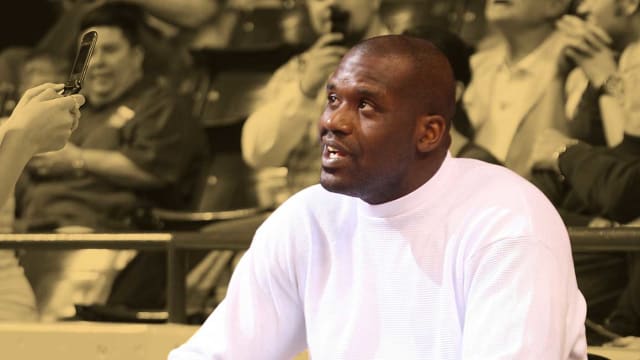Over the years, Shaquille O’Neal has emerged as one of the NBA’s most charismatic and influential figures, not just for his dominance on the court but also for his larger-than-life personality off it. Yet, even legends have their stormy chapters. Shaq’s rebellious streak, particularly during his later years with the Los Angeles Lakers, frequently landed him in hot water, creating headlines filled with fines, suspensions, and public controversy.
The 2003-04 season was especially turbulent. Shaq’s relationship with a young, ambitious Kobe Bryant was strained, as both vied for recognition as the team’s leading star. The tension permeated the Lakers’ locker room and even spilled onto the court, manifesting in moments of visible frustration during games. One notable instance came after a 102-85 loss to the Sacramento Kings, when Shaq openly cursed at officials. “I was just speaking my mind and I’ll continue to speak my mind… But kids, don’t use this as an example,” he remarked, adding, “Not impressed, not impressed, not (expletive) impressed, you know what I mean?”

The outburst was fueled by more than just anger—it reflected a broader dissatisfaction with his performance that night. Shaq had ended the game with only 10 points and five rebounds, an unusually low output for a player of his caliber, which contributed to his confrontation with the referees. The league responded with a $295,000 fine and a suspension for a game without pay, a punishment many deemed excessive. Even coach Phil Jackson criticized the NBA’s perceived vindictiveness, highlighting the disparity between Shaq’s fine and those of other players like Steve Francis, who faced $25,000 penalties for similar conduct.
Despite these controversies, Shaq’s larger persona never wavered. Fans continued to admire him not just for his dominance on the hardwood—four NBA championships are proof enough—but also for the humanity he displayed off it. Even during moments of tension or personal frustration, Shaq consistently demonstrated generosity and mentorship, often helping those who lacked the spotlight.
One telling example was his relationship with teammate Mark Madsen, a bench player who didn’t naturally fit into the Lakers’ social dynamics. Shaq purchased a car and a $1,000 suit for Madsen to help him integrate into the team, showing an often-overlooked side of the star: the protector and nurturer. “[Madsen] was the purest NBA guy I ever met,” Shaq said. “He really was. And I had to protect that. Most rookies, when they come in, go crazy, including me. I went crazy. Mark was none of that… It was my job to protect him, but I still wanted to make him cool, part of the guys.”
Shaq’s ability to balance rebellion with compassion is part of what made him an enduring figure in basketball history. While he may have clashed with authorities, teammates, and opponents, he also left a legacy of mentorship, philanthropy, and unfiltered authenticity that resonated far beyond the court. His actions remind fans and players alike that greatness in sports isn’t measured solely by statistics, championships, or flawless behavior—it’s also defined by the courage to speak one’s mind and the generosity to uplift others.
Even today, Shaq’s story serves as a powerful lesson: a player can be fiery, flawed, and controversial yet still inspire, protect, and lead. His career, punctuated by $295,000 fines, on-court outbursts, and off-court acts of kindness, encapsulates the duality of a superstar whose influence extends well beyond basketball. In the end, Shaq proves that true greatness is about impact—both in the game and in the lives of those around you.
Leave a Reply